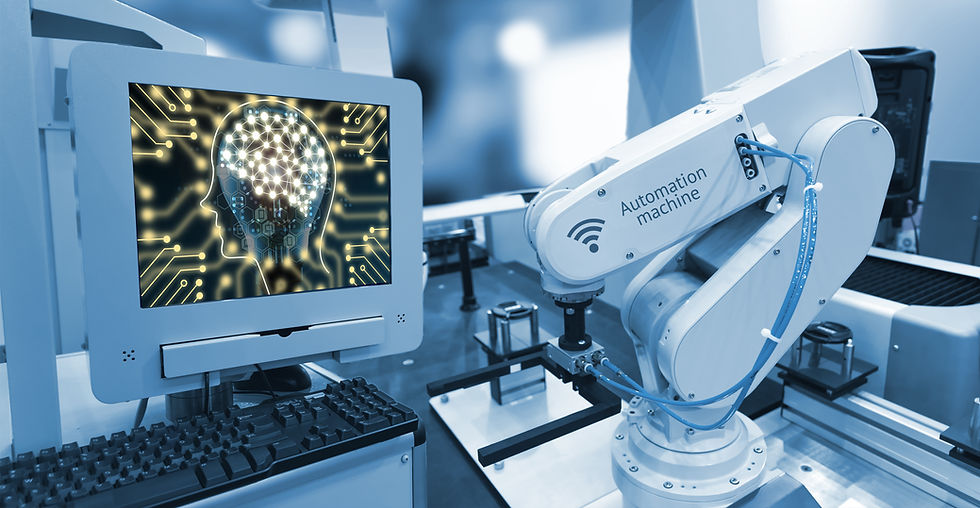Revolutionizing Healthcare: Top 5 AI Use Cases for Enhancing Patient Care and Hospital Efficiency
- Srihari Maddula
- May 2, 2023
- 4 min read
Updated: Jun 9, 2023
Artificial Intelligence (AI) has brought about revolutionary changes in the healthcare industry. With its potential to analyze vast amounts of data quickly and accurately, AI has several use cases that can significantly improve patient care and hospital efficiency. Here, we discuss the top 5 AI use cases in healthcare.

Medical Imaging Analysis: Medical imaging analysis is one of the most significant applications of AI in healthcare. Radiologists use AI algorithms to interpret medical images such as X-rays, MRIs, and CT scans. AI can detect and diagnose diseases with higher accuracy and in less time, leading to better patient care. AI can also help identify patterns and correlations that may not be apparent to the human eye, which can lead to earlier diagnoses and better treatment outcomes. One example of AI in medical imaging analysis is the use of deep learning algorithms to analyze mammograms for breast cancer. These algorithms can identify patterns and features in the images that may indicate the presence of cancer, leading to earlier detection and better outcomes for patients.
Predictive Analytics: Another significant application of AI in healthcare is predictive analytics. AI can help doctors predict the likelihood of patients developing specific conditions, such as heart disease or diabetes. By analyzing vast amounts of data, AI can identify patients who are at risk of developing certain health problems. Doctors can then intervene early and take preventive measures, leading to improved patient outcomes. One example of predictive analytics in healthcare is the use of AI algorithms to predict sepsis in hospital patients. Sepsis is a life-threatening condition that can develop quickly, but early detection and treatment can significantly improve outcomes. AI algorithms can analyze patient data, such as vital signs and lab results, to identify patients who may be at risk of developing sepsis. This can help doctors intervene early and provide timely treatment.
Personalized Medicine: Personalized medicine is another significant application of AI in healthcare. AI analyzes a patient's medical history and genetic makeup to develop personalized treatment plans that cater to individual needs. Personalized medicine ensures that patients receive the right medication and therapy, leading to better health outcomes and fewer side effects. One example of personalized medicine in healthcare is the use of AI to develop personalized cancer treatment plans. AI algorithms can analyze a patient's genomic data to identify specific genetic mutations that may be driving the cancer. This information can be used to develop personalized treatment plans that target these specific mutations, leading to better outcomes for patients.
Chatbots and Virtual Assistants: AI-powered chatbots and virtual assistants can assist patients with routine tasks such as scheduling appointments, refilling prescriptions, and checking lab results. Chatbots can also answer common medical questions and triage patients, freeing up doctors' time and improving hospital efficiency. One example of chatbots in healthcare is the use of AI-powered chatbots to help patients with mental health conditions. These chatbots can provide support and guidance to patients with conditions such as depression or anxiety, helping them manage their symptoms and access resources and treatment options.

Predictive Maintenance: AI can also be used for the predictive maintenance of medical equipment. AI algorithms can analyze data from medical devices and predict when equipment is likely to fail. This can help hospitals avoid unplanned downtime and reduce maintenance costs, ensuring that patients receive timely care. One example of predictive maintenance in healthcare is the use of AI to monitor medical devices such as MRI machines. AI algorithms can analyze data from the devices to identify patterns that may indicate a potential problem. This can alert technicians to perform maintenance before the device fails, reducing downtime and ensuring that patients receive timely care.
In conclusion, AI has brought significant changes to the healthcare industry, providing innovative solutions to improve patient care and hospital efficiency. As AI technology advances, we can expect to see more exciting use cases that will continue to transform the healthcare industry, from improving drug discovery and medical research to developing new treatment options and improving patient outcomes. With the help of AI, the healthcare industry has the potential to revolutionize the way we approach healthcare and improve the lives of people around the world.
However, it's important to note that AI in healthcare is not without its challenges. One significant challenge is ensuring the accuracy and transparency of AI algorithms, particularly when it comes to decision-making that affects patient care. There is also a need to address concerns around data privacy and security, as well as ensuring that AI technologies are accessible and equitable for all patients.
Despite these challenges, the potential benefits of AI in healthcare are significant. By providing doctors and patients with innovative tools and insights, AI has the potential to revolutionize the way we approach healthcare and improve patient outcomes. From personalized medicine to predictive analytics and medical imaging analysis, AI is transforming the healthcare industry and paving the way for a brighter, healthier future.
As AI continues to evolve and become more sophisticated, we can expect to see more exciting use cases in healthcare emerge. These may include the use of AI-powered robots to assist with surgery and other medical procedures, as well as the development of more advanced AI algorithms to analyze complex medical data and identify new treatment options.
Overall, the future of healthcare looks bright with the help of AI. While there are still many challenges to overcome, the potential benefits of AI in healthcare are vast, and we are only beginning to scratch the surface of what is possible. With continued research, development, and collaboration, AI has the potential to transform healthcare and improve the lives of patients around the world.










Comments